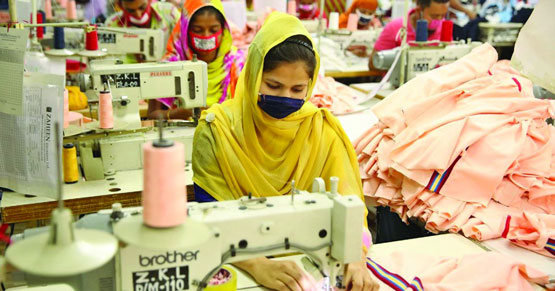Garment sector under threat
Mahfuja Mukul: In the last few days, the garment sector has been under threat due to arson, vandalism and attacks on 25 factories in the capital including Gazipur, Ashulia and Savar. At least 650 garment factories have been closed for three days in the face of agitation by garment workers over minimum wages. Out of this 235 in Mirpur, 35 in Ashulia and 386 in Gazipur. This has disrupted normal production.
According to the concerned, foreign buyers usually place new orders in these 3 months from October to December. Now the way factories are vandalized and set on fire in the name of labor movement, this sector will be under threat.
In the past four months (July-October), the export of ready-made garments to the world market has decreased. Revenue fell short of target by $1.44 billion. Now the movement of workers demanding minimum wages has been added. At the same time, the political program-blockade is going on. Due to this, the internal communication system has become inactive and there have been various negative effects in this industry.
To find out, Syed Nazrul Islam, the first vice president of BGMEA told Daily Industry that a group in the name of movement is threatening to destroy this sector. Workers, garment owners, the country will all be affected. It should be remembered that the garment industry is the only sector on which the country’s economy has been strengthened. He said, “Foreign buyers usually place new orders from the current month to the next December.” Now what is going on in the name of labor movement, there is danger of great loss.
Finance advisor of the former caretaker government ABM Mirza Azizul Islam said, ‘80 percent of the total export income comes from the sector, that is the garment sector. But vandalism of garments, arson and assaults on the basis of salary are not desirable. If the clothing sector is damaged, there will be a big blow to the economy. We are already in a dollar crisis. Garment is one of the dollars earning sectors. At the moment, it is necessary to take all kinds of steps to sustain the garment sector.
The concern of the concerned, national elections ahead. Political programs are already underway. Before the announcement of the minimum wage, the labor movement may have been fueled by someone. In the past there was agitation after the announcement of wages. This time, before announcing the wages, it is necessary to look into the reason for the movement. Care should be taken to ensure that no party can use innocent workers to destabilize the situation in the country.
Garment industry is already in crisis due to global recession. Retaining export earnings has now become a challenge. Foreign buyers have reduced their purchases due to reduced demand. The Bangladesh Garment Manufacturers and Exporters Association (BGMEA) is concerned that orders for the January-February season may decrease if the political unrest persists.
Meanwhile, competing countries like Vietnam-Cambodia are eager to increase their orders by taking advantage of the political unrest in Bangladesh. In this situation, traders call upon the political parties to be tolerant to prevent the collapse of the country’s import-export trade. BGMEA leaders have already met with Home Minister Asaduzzaman Khan Kamal regarding the situation. They also met with the wage board.
There is already a dollar crisis in the global context. And export is one of the two main sectors of the country’s dollar income. A major part of which is coming from the garment sector. In the current financial year, the target of foreign exchange earnings of this sector is $5,227 million. And the target of total export income is $6200 million. But the concern is that the sector is under three-pronged pressure. First, the political movement-blockade, second, the workers’ movement and finally the global crisis.
BGMEA President Farooq Hasan recently said that Bangladesh’s garment industry is currently going through a tough time due to the ongoing global economic instability due to the Russia-Ukraine war and high inflation. The global economic downturn has reduced consumer spending on clothing. As a result, apparel orders have decreased. Hence exports have decreased. In addition, the demand for the shortest possible Leadtime for product delivery in the fashion industry is increasingly high.
The incident started with the salary of garment workers. On October 22, the representative of the labor side proposed to the wage board to raise the minimum wage of garment workers to Tk 20,393. On the same day, against the workers’ proposal, the owner’s representative proposed a minimum wage of Tk 10,400. The workers came to the streets on this news. Blockades, protests, factory vandalism, arson began.
In this context, the executive president of BKMEAMd Hatimsaid Daily Industry on Friday that some people called workers are vandalizing and setting fire. They are not actually garment workers. A gang is out to destroy the garment industry. If this continues, garment exports will decrease. Foreign buyers will not order. Which means going towards the destruction of this industry.
Liaqat Ali Mollah, Chairman of the Minimum Wage Board, said, “Our most important thing was to bring the salary from seven grades to five. Here both the employer-employee have agreed. However, there will be another meeting on the minimum wage in the second week of this month. The minimum wage will be determined in that meeting. In the meeting of that day, BGMEA has been asked to submit a proposal in written form. The proposal given earlier by BGMEA is very different from the proposal given by the workers. Hopefully it will decrease.
Rare Israeli airstrike in Beirut kills Hezbollah commander and more than a dozen others
International Desk: Israel launched a rare airstrike that killed a senior Hezbollah milita…








